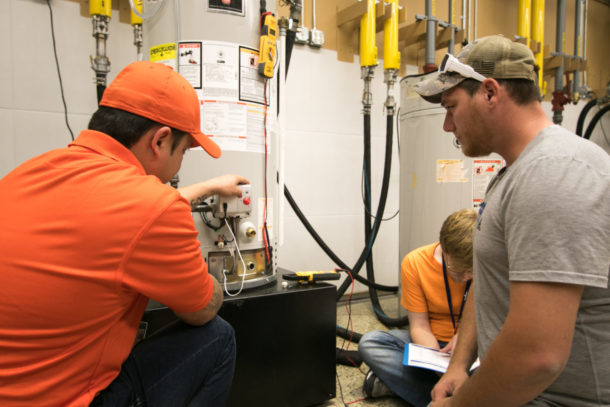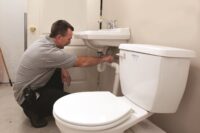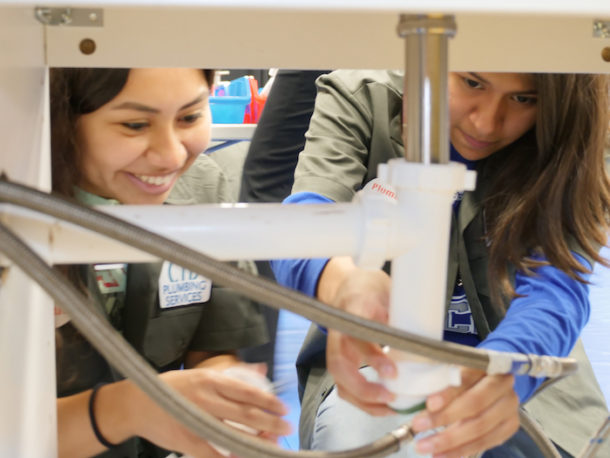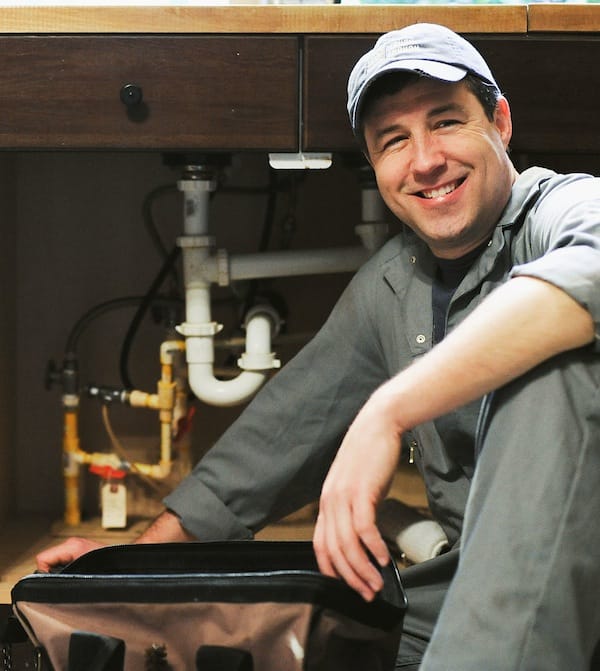Like any other industry, plumbing relies heavily on efficiency. While this may be a relatively easy issue to manage when you are a one or two-person venture, it becomes far harder for large teams. Not least because you will have a combination of permanent and temporary employees spread out across multiple sites. If you fail Read more
Employees

Like any other industry, plumbing relies heavily on efficiency. While this may be a relatively easy issue to manage when you are a one or two-person venture, it becomes far harder for large teams. Not least because you will have a combination of permanent and temporary employees spread out across multiple sites. If you fail to give this aspect the attention it deserves, things can quickly spiral out of control.
However, plumbing companies can regain control by putting the right strategies in place. Here are some of the most effective solutions that can be used regardless of whether you focus on B2B, B2C, or both.

Manage Timesheets More Effectively
All contractors and employees deserve to be paid fairly. However, you can not allow people to take liberties by charging for hours when they are not working. Using an all-in-one time tracking system to manage your teams across all sites is highly advised. When integrated with payroll, people can get paid quicker, which will make them happier. Better still, you will save time and money on this aspect of admin.
Moreover, it becomes easier to know where the company stands financially. Not least because you’ll remove errors while simultaneously having access to updated data.
Manage Your Fleet
Virtually all plumbing companies provide a mobile service. Efficient journeys are an essential part of the process as they allow your team to complete more jobs. Using fleet management software ensures that the right workers are dispatched to the right jobs. Moreover, you can check their routes and even factor in traffic jams and other issues. Companies become more efficient while workers and clients have an extra reason to be happy.
It is a particularly important step for companies with a nationwide or multi-state presence. However, even smaller local plumbing firms will see significant benefits.
Ensure That Workers Have The Right Tools
Using the right tools and equipment enables plumbers to do their jobs more efficiently. This translates to increased speeds and accuracy, thus providing a platform for greater success. A next gen stud finder, for example, can streamline this part of the process. Similarly, a variety of tools can be used to identify and diagnose problems quickly. In turn, plumbers can get to work on the solution to those issues.
Having trusty handheld tools is equally crucial. Aside from allowing plumbers to work faster, they can complete the job correctly. This reduces free callouts to repair mistakes.
Improve Your Financial Spending
Finally, you should never overlook the need to keep an eye on overheads as well as revenue. From efficient ad campaigns that gain better ROIs to changing telecom providers, many upgrades can be made. It is vital that you review all expenses on a regular basis to identify areas of improvement. Any opportunity to save money without compromising on the quality of your output should be taken.
It boosts your profit margins per client as well as your break-even point. In turn, this will lift a weight of stress from your shoulders and give the whole venture a better chance to thrive.

When you’re running a plumbing business, you will always face challenges managing your company and ensuring that you deliver the best service to your clients. Once you are aware of these challenges you will know the best ways to handle them. Here are some key examples that you should keep in mind. Avoiding Disruption First Read more
When you’re running a plumbing business, you will always face challenges managing your company and ensuring that you deliver the best service to your clients. Once you are aware of these challenges you will know the best ways to handle them. Here are some key examples that you should keep in mind.
Avoiding Disruption
First, you need to make sure that you are taking steps to avoid disruption in your business model. Significant levels of disruption are an issue, particularly if you are working for commercial clients. For instance, you might need to provide your client with an underground tank replacement at an operating business property. To avoid disruption, it’s important to make sure that you can be flexible to client needs. To steps to work around their schedule. This is one of the best ways to earn a positive review or a referral. We’ll discuss this further down.

Maintaining Trust
Whenever clients use a plumbing service, they want to hire a company they can trust. They will always be weary about whether they are protected financially and if there are any hidden risks of using your solution. You need to take steps to put their minds at ease. One of the ways that you can do this is by offering both guarantees and warranties on your services. You should also provide various contact points that customers can use if they do ever have an issue.
Earning Positive Reviews
Next, you should aim to gain positive reviews for your plumbing business. Without the right positive reviews, you are going to struggle to build up your client base. You might find that new clients will not provide your company with the chance it needs. This can be troublesome if you are just getting started in the plumbing industry and you don’t yet have a loyal base of customers. To earn positive reviews, you need to put a strong focus on customer care and client satisfaction. You should also remember to ask for reviews and feedback. Even a few mixed reviews create a more positive impression than zero reviews connected to a new business brand.
Hiring The Right People
Finally, you need to make sure that you are hiring the right people in your plumbing business. A lot of plumbing companies these days are choosing to use the services of freelancers. While they may help cut costs, freelancers can cause issues because they are not as loyal to a company they’re working for. They can simply move onto the next project or company that hires them. You will also struggle to build up a significant relationship with freelancers. As such, it might be best to instead use a recruitment agency and hire the best permanent workforce with the right skills, qualifications, and experience.
We hope this helps you understand some of the key challenges that you can encounter when you are running a plumbing business and the steps that you should take. In doing so, you can beat your competitors and keep your profit levels healthy.

If you’re looking to build up the services that your plumbing business can offer to your local community, then at some point, you’re going to have to look beyond what you, yourself, can provide and will need to grow your team. If you don’t want to rely on sub-contracting alone, then you need to learn Read more
If you’re looking to build up the services that your plumbing business can offer to your local community, then at some point, you’re going to have to look beyond what you, yourself, can provide and will need to grow your team. If you don’t want to rely on sub-contracting alone, then you need to learn about what you can do to build and manage your own team. Here are a few tips on how to do that.

Put the right hiring practices in place
One of the most common problems when managing a plumbing business is finding and hiring people with not just the skills that you need, but the same approach to plumbing and customer interaction. Finding skilled workers alone can be tough, but you need to make sure that you’re specific in the skills that you’re looking for, while also keeping an eye on the attitude of the worker. Do they have the same attention to detail with customer relationships and customer service as they do with the plumbing?
Know how to retain your team
Once you’ve hired the right team, you want to make sure that you can keep a hold of them, as well. However, that’s not always as easily said as it is done. Retention has to begin from the very beginning, with a set and reliable onboarding process that welcomes them to the team. Aside from offering competitive wages and benefits and offering the training and education to help your team grow, you can help better retain your plumbers by showing some appreciation now and then and taking their own needs, such as their work/life balance into account.
Get to know your responsibilities
As an employer, you’re going to suddenly find yourself dealing with a lot more responsibilities. Most important is providing a safe working environment by teaching what safety skills you need to and providing the PPE necessary for every job. Second to that is ensuring that payroll is handled correctly, not only in terms of paying your team the agreed amount on time but also making sure that you get your taxes right as an employer with an online federal tax id number filing service. There are, of course, other legal responsibilities that you should take your time to get acquainted with to make sure that you’re actually doing your job as an employer.
Build your management skills
As an employer, unless you have a large team with management in the middle, then you are also going to be responsible for directing your team. As such, taking a management course can help you learn how to communicate with them, manage their morale, and treat them with the appropriate levels of respect and trust. Not everyone is a born manager, it can be more difficult to direct a team of employees than you might think, so it’s worth seeing what you can learn.
As an employer, you have to deal with many responsibilities and learn new skills. The tips above can help you do just that.

Are you thinking of setting up a plumbing business? You have come to the right place. If you want to create a successful plumbing business, you need to build it on solid foundations, more than just hiring great employees. Read on to find out how to establish a plumbing business and thrive. Business Website In Read more
Are you thinking of setting up a plumbing business? You have come to the right place. If you want to create a successful plumbing business, you need to build it on solid foundations, more than just hiring great employees. Read on to find out how to establish a plumbing business and thrive.

Business Website
In the past, the first thing you needed for a plumbing business was a business card. A business card has your telephone number and some of your services on it. Nowadays, the first thing you need is a website that can be found on the internet business database. But it’s easy to set up.
Starting a website these days is fairly straightforward with a website builder. The traditional route is to use WordPress or something similar, but other websites like UENI are better for small plumbing businesses. When you have a website, apply to Google My Business for a listing.
Training and Experience
If you want to operate a professional plumbing business, you need to know your trade. On average, it takes four years of apprenticeship to learn the business and gain enough hands-on experience to strike out on your own. Most plumber work with an agency for a number of years.
The best advice is not to start too early on a self-employed basis. Although you have completed an apprenticeship, there is still a lot to learn about the industry, customer services, and tricks of the trade. Make sure you are in a reliable position to start your self-employed plumbing career.
Plumbing Tools
Along with a website, training and experience, and a lot of self-starter motivation, you will also need a range of plumbing tools. Hopefully, you have acquired a personal collection of plumbing tools over the years, but this might not be enough for a business if you have some employees.
Standard plumbing equipment you need for business includes pipe cutters, a soldering torch, pliers, a pressure test kit, and a pipe bender. Additionally, you might require drum weighing scales which are industrial-sized scales used to verify the capacity and resolution of materials.
Authority Licenses
There’s no chance of starting a plumbing business in your area without the proper authority licenses; doing so can lead to hefty fines as well as legal and insurance issues. Make sure you have the proper documents so you can legally practice your trade in the local area or state.
Authority licenses have to be considered one of the foundations of operating a successful plumbing business; not only does the correct accreditation make your business legal and insurable, but it also inspires confidence in your customers. They want a plumber with credentials.
Growth Strategy
Now that you have the foundations of your business, it’s time to find customers and grow. Growing a plumbing business is a combination of marketing efforts and word-of-mouth. Make sure you carry out work professionally and try to get positive reviews to use on the website. If you’re tech-savvy, you can also set up an aftercare review and build up online social proof.

The terms employee and team member have become almost interchangeable in recent years. But it’s important to understand the real difference between the two words because it’s more than just terminology. A team reflects one kind of company culture — accountable, engaged and goal-oriented — and an employee/employer relationship represents another kind — transactional and Read more
The terms employee and team member have become almost interchangeable in recent years. But it’s important to understand the real difference between the two words because it’s more than just terminology.
A team reflects one kind of company culture — accountable, engaged and goal-oriented — and an employee/employer relationship represents another kind — transactional and uninspired. One of these cultures supports growth and innovation; the other leads to mediocre results and stagnation.
Which one describes your company?

Employees vs. team members
The difference between an employee and team member is subtle. But it’s a crucial distinction and essential knowledge for leaders in the skilled trade industries, where acute labor shortages keep recruiting and retention intensely competitive.
Employees
- Go to work for a paycheck.
- Do exactly what’s expected of them — but no more.
- Don’t invest their own ideas or initiative.
- Won’t positively reinforce your brand outside of work.
- Likely to frequently leave one job for another.
- Overlook details and lack accountability which can lead to major oversights.
Team members
- Recognize they are part of something bigger than themselves.
- Get paid to do what they’re passionate about.
- Foster new ideas and drive innovation.
- Serve as ambassadors for your brand with customers, friends and family.
- Create institutional continuity and act as positive role models for other team members.
- Work together toward a single goal and usually get more done in less time with fewer mistakes.
It doesn’t take long for the differences to add up. The costs to your company come in many forms, with rollbacks, dissatisfied customers, damaged reputation and missed opportunities among them. When an employee leaves your company for a $1 an hour raise across town, you’re left with the cost of hiring and training their replacement.

Building your team
When it comes to recruiting and developing team members vs. employees, it isn’t as simple as just switching out one job title for another. Team members need a team. It’s up to you to build your company with a solid mission that gives prospective team members reasons to join and stick with you. Here are some key concepts to incorporate at your company in building and transforming your team:
- Communication: This goes both ways. Keep lines of dialogue open so team members can share their ideas. It’s also important to communicate clearly with team members so they know what’s expected and what goals they’re working toward.
- Celebration: From a quick shout-out when you see small things done the right way to bonus pay, don’t let superior performance go unrecognized. Build in big incentives for motivation, take time for regular call-outs and encourage team members to cheer each other on.
- Culture: Don’t let “team” be a buzzword at your company. The people who work there know the difference, no matter what you call it. When they feel valued at work it gets passed on to customers. When they don’t feel valued, that’s passed on, too. Create an authentic team concept by intentionally investing in your team and the resources they need for success.
Put it all together
Teamwork is no longer an option for contractors. With the emergence of Generation Z and the deep economic impact of COVID-19 paired with other supply chain and labor issues, a passion and dedication for team culture is required for success in home services.
A real team is built on vision, values and mission. If you’re committed to living all those every day and being accountable, the people around you recognize it. Talk to your team, encourage them to buy in and you’ll see the difference.
 Chris Koch is Head Coach and Trainer for Business Development Resources – the premier provider of business training and coaching to home service contractors across North America.
Chris Koch is Head Coach and Trainer for Business Development Resources – the premier provider of business training and coaching to home service contractors across North America.
